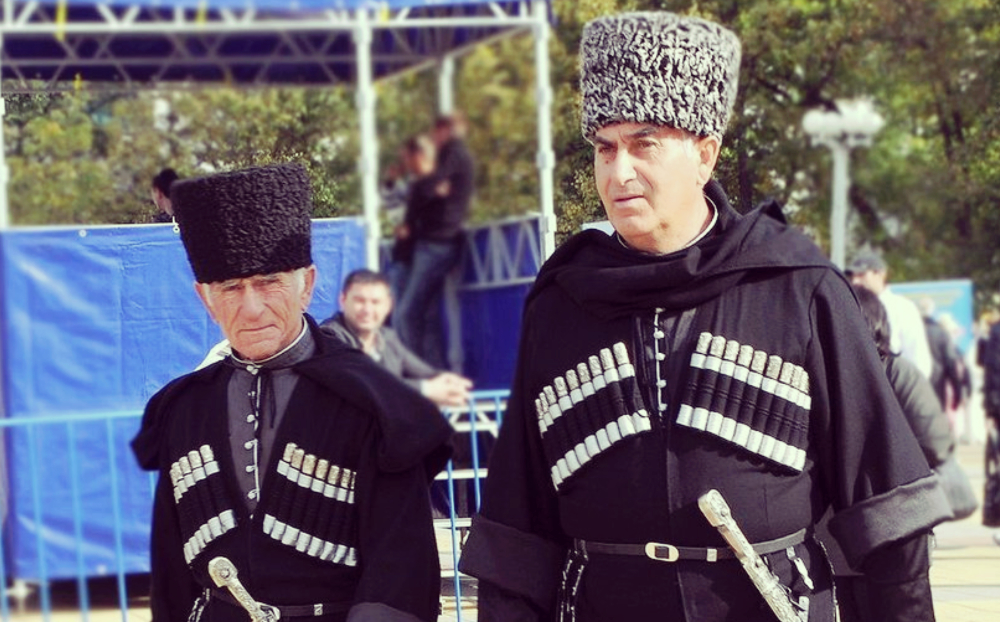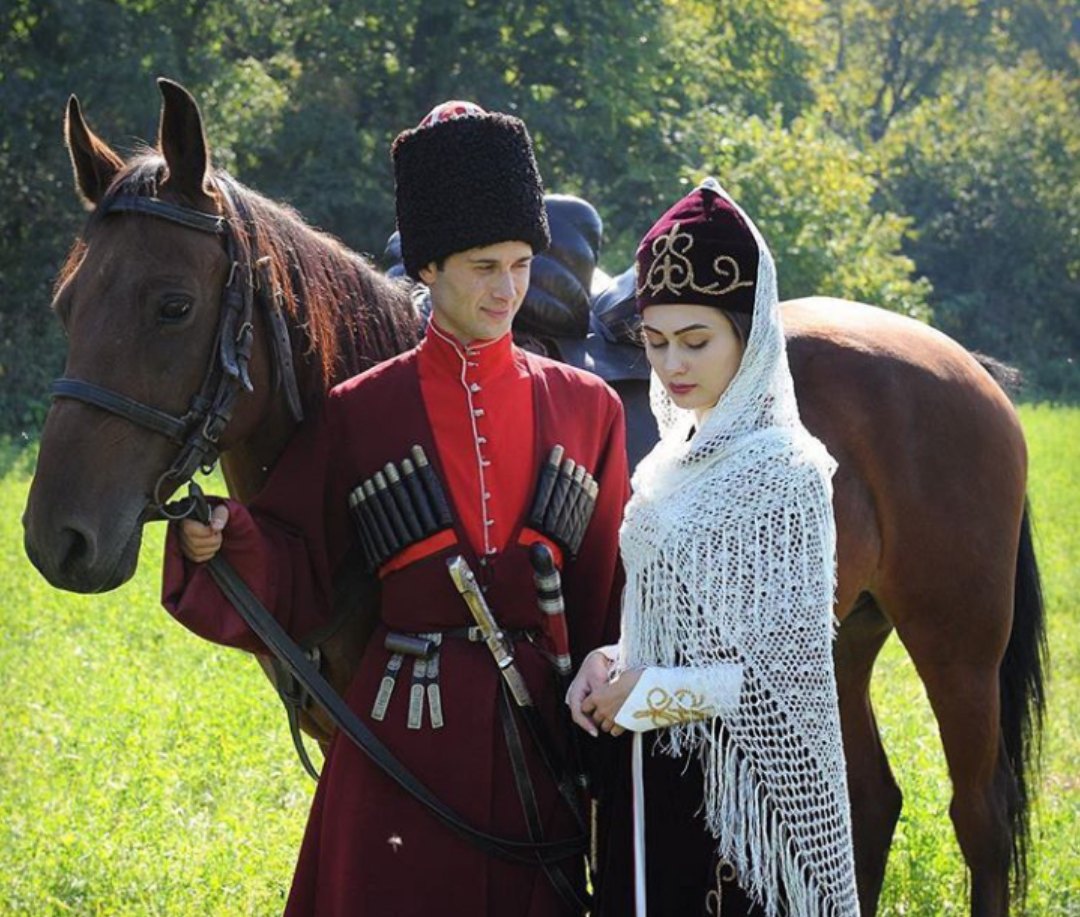Being a Man in the Circassian Way, by Naima Neflyasheva

Two men in traditional Adyghe attire from the 19th (left) and 21st (right) centuries.
Naima Neflyasheva, a scholar and Senior Research Fellow at the Institute of Oriental Studies of the Russian Academy of Sciences, explores what it means to "be a man" in Circassian culture. She discusses the rules and norms regarding appearance and behaviour that have developed over centuries, examining what has changed and what remains valued today.
This article was first published on the Sovetskaya Adygeya website and is translated from Russian.
Appearance
Circassian tradition is unanimous in its description of the ideal male appearance: a perfectly handsome man is tall, broad-shouldered, with a slender waist, lean build, and a distinct bearing.
The well known Caucasus expert F[riedrich von] Bodenstedt, who observed Circassian elders during negotiations with a Russian general in the mid-19th century, wrote: "It is an indescribable pleasure to gaze upon these tall, strong men with their gleaming eyes, expressive faces, proud gait, and effortless movements." The French traveller and diplomat Aubry de La Mottraye, who visited the Caucasus in the 18th century, remarked that among the Circassians, "there was not a single man or woman who could be called unattractive. Their physique is one of the finest, and it perfectly complements the beauty of their faces."
Russian academic [of German origin ―Ed.] J[ulius] Klaproth, who visited Kabarda in 1808, noted: "In general, the Circassians can be considered a handsome nation. The men, in particular, stand out with their tall stature and fine physique, as they go to great lengths to maintain their slim waists. They are usually of medium height, very strong and muscular. Their shoulders and chests are broad, their waists always very narrow, and they typically have chestnut hair, brown eyes, elongated heads, and narrow straight noses."
A man must always be neatly and tidily dressed. "It is worth noting," wrote the Adyghe historian Khan-Giray, "that overly ornate dressing is considered somewhat improper. They strive to show taste rather than flamboyance, and cleanliness and neatness are preferred over grandeur." Even in hot weather or during hard labour, Circassians never appeared before others with a bare torso or without a belt. Only the very elderly could afford such a departure from tradition. A man would step into his own yard in the morning fully dressed in traditional attire.
The knightly code [etiquette] of Werq Khabze (Уэркъ Хабзэ) prescribed that a man should possess qualities such as loyalty, courtesy, courage, truthfulness, and simplicity, while a love for luxury, domestic comfort, or an inability to endure hunger was seen as a weakness of the Circassian spirit.
[Werq Khabze (уэркъ хабзэ) was the most developed and rigid of all the caste codes of behaviour. This class acted as the liaison between the prince and his people, and proper conduct was essential to ensure the smooth running of the principality. (See: A. Jaimoukha, 'The Circassians: A Handbook', Routledge, Palgrave, 2001, pp 157-60) ― Ed.]
Circassians held their weapons, horses, and headgear—whether a papakha or bashlyk—in the highest regard. If anyone touched a man's headgear, it was considered equivalent to an insult. Even princes and nobles could be seen wearing torn cherkeskas, but their headgear was always expensive and well-made. This is because headgear represented masculinity, and a man's hat was certainly not to be confused with a woman's scarf! In Circassian folklore, there are proverbs and expressions that illustrate this. For example, when someone wanted to shame a coward, they would say he was not worthy of wearing a hat and should replace it with a scarf—this way, no one would expect him to live up to the standards of manhood. Even today, the Circassians have a saying: "If you meet a fool, give him your hat and walk on." In other words, do not lower yourself to argue with him.
The Werq Khabze code/etiquette demanded that a man show loyalty (to his prince, friend, family, parents, and relatives), courtesy (including respect for personal dignity, personal freedom, elders, and women), courage (bravery and composure in battle), truthfulness, and simplicity. A love for luxury, comfort, and an inability to withstand hunger were regarded as signs of weakness in the Circassian spirit.
An interesting nuance regarding mutual courtesy was noted by Khan-Giray: "It is remarkable that all these rituals of politeness are observed even when princes and nobles hate each other, and even when they are outright enemies. If they happen to meet in a place where the rules of decorum prevent them from using their weapons—such as in the house of a prince or nobleman, in the presence of women, at aristocratic assemblies, and in similar situations where propriety forbids drawing weapons, even enemies remain within the bounds of courtesy."

Duties within the Family
A man's role in the family was to provide for its material needs, take responsibility for the family and clan, and protect them. Thus, even a hundred years ago, boys were raised to be providers and warriors.
All major decisions within the family were always made by the men. Clan leadership was typically held by men aged between 50 and 70, known for their impeccable reputations both in military and civilian affairs. According to ethnographer B[arasbiy] Bgazhknokov, society viewed these men as possessing "extensive social experience, courage, intelligence, a profound knowledge of customs, undeniable oratory skills, and strong organisational abilities." Poor men could not assume leadership of a clan, as a man's financial status, while not decisive, played an important role.
Every man was expected to have children, particularly healthy sons. Having children was a measure of a man's social success. The Circassians had a saying: "A father without heirs is like meat without bones."
The man was the head of the family, and a woman never contradicted him publicly, nor did she take on the role of commander, let alone speak to him in a commanding or categorical tone. Wise women always upheld their husband's authority in front of the children and society. Disagreements were never aired outside the home; they sought to smooth over conflicts, preventing gossip from entering their private space. Typically, Circassians would say of a wife who found the right approach with her husband and advanced his standing in society: "A worthy husband is the merit of his wife." Or, "A man's reputation damaged by friends is restored by a good wife."
During meals, children did not sit at the same table as the men. According to ethnographer M[ukhtar] A. Meretukov, among the Circassians, "men and women ate in separate rooms and never sat at the same table. Children were also fed separately." In the early 19th century, Frenchman Thébault de Marigny wrote about this custom: "A Circassian family never dines together; the father and mother dine separately, as do the children, who are divided by age and gender." Ethnographers in the early 21st century recorded accounts from elderly Circassian women, who shared that they never allowed themselves to eat or drink water in the presence of their husbands throughout their lives. Today, of course, the situation has changed — the shared family meal around a common table now provides an opportunity for the elders and the younger members to communicate, share their concerns, and celebrate their achievements.
The man in the family was surrounded by respect, maintaining a dignified distance. "He did everything without haste or fuss, spoke little but with authority, carrying himself with dignity and a sense of his superiority. He avoided jokes, and expressed approval or disapproval not so much with words, but with a look, facial expression, or gesture," wrote B. Bgazhknokov. Men in the family were considered ritually and energetically "older" than women, meaning that a boy, even in his teens, was ritually regarded as older than his sister or aunt. However, this principle was balanced by the traditionally respectful and honourable treatment of women.
Once, my sister and I were on our way to offer condolences in Maykop, and we met our nephew Kemal, who was around 10 or 12 years old at the time. He was playing with friends, but upon learning where we were headed, he insisted on escorting us all the way to the door, taking on the role of the "elder."

Husband and Wife
"Adherence to the principles of noble honour required a warkh to control his natural emotions and feelings. In this regard, the Circassian knights’ attitude towards women and love is particularly intriguing. On the one hand, they chivalrously exalt women, fulfil their desires, and perform feats to win their favour. On the other hand, they are extremely reserved in showing their feelings towards the opposite sex, organising their lives in such a way as to avoid being too often under their ‘relaxing’ influence," writes modern historian Aslan Marzey [Aslanbek Mirzoev].
In Adyghe culture, public displays of affection by a man for his beloved or wife were uncommon. You would not encounter serenades beneath balconies or any tactile displays of affection in public. Such behaviour was considered highly inappropriate and a sign of unacceptable sentimentality in a man. Men expressed their feelings, care, and attention in other ways. A hundred years ago, it might have been through victory in a horse race, dedicated to a young woman, while today it is through fulfilling her whims and requests, shielding her from hard physical work, and showing respect to her parents and relatives.
When addressing his wife in front of others, a man would often invent a new name for her. These names were typically terms like "Very Beautiful," "Snow White," or "Little One" — suitable only in the company of friends or younger family members. Often, the husband would playfully tease his wife with these names, calling a dark-skinned woman "Snow White" or a large woman "Little One." By tradition, a man would never smile at his wife in public, nor would he ever hold a child, especially in the presence of his father. Heaven forbid anyone ask him about his wife or children — his response would be curt and laconic. However, a man was vigilant in ensuring his wife did not take on masculine tasks or responsibilities. As the saying goes: "A hen that starts crowing like a rooster will burst."
According to adat, a man was not supposed to overtake a woman on horseback but should dismount and lead his horse by the reins. If a woman passed by, regardless of her age, men were expected to stand as a sign of respect. In Caucasian tradition, a man always walked ahead of a woman. On a narrow mountain path, they might be confronted by a wild animal or a blood enemy, and the man, like a tiger, would leap to defend his wife and the mother of his children.
Today, it’s often said that men’s and women’s roles in the Caucasus have changed. More frequently, women take on the role of breadwinners, make the major decisions in the family, and sometimes even support the men — that the old ways have been undermined, and that today’s men are spoiled and indulgent.
Even if there is some truth in this, there are still Circassian men who live up to the most captivating descriptions of the 19th and early 20th centuries. These men are truly men — bold and responsible. They fear nothing but dishonour, work hard, care for their parents, and, like the wings of an eagle, shield their large families from hardship.
Naima Neflyasheva, Candidate of Historical Sciences, Senior Research Fellow, Centre for Civilisational and Regional Studies, Institute for African Studies, Russian Academy of Sciences.